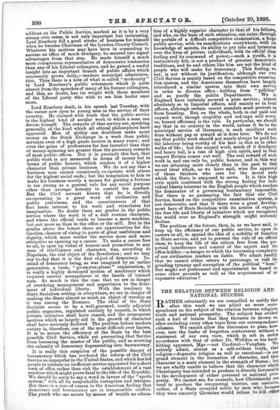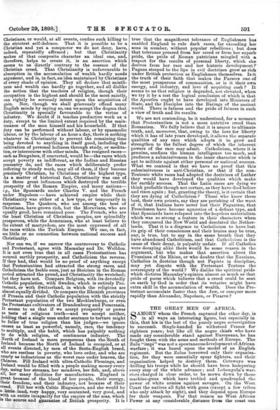THE RELATION BETWEEN RELIGION AND NATIONAL SUCCESS. R ATHER reluctantly we
are compelled to notify that after this week we can admit no more corre- spondence on the subject of the relation between religions truth and national prosperity. The subject has evoked such a hail of letters that they threaten to drown us, after excluding every other topic from our correspondence columns. We cannot allow the discussion to pass, how- ever, into the limbo of forgotten controversy without a statement of our own view, which is not in entire accordance with that of either Dr. Welldon or his hard- hitting opponent, Mgr.—not Cardinal—Vaughan. We entirely admit, almost as a self-evident truth, that religion—dogmatic religion as well as emotional—is one grand element in the formation of character, and that character is a main element in the strength of Slates ; but we are wholly unable to believe that the character which Christianity was intended to produce is directly favourable to the development of either personal or national pros- perity. We cannot see, for example, how Christianity can tend to produce the conquering warrior, can conceive, rather, of a State occupied solely by men who because they were sincerely Obristian would refuse to kill otdor Christians, or would, at all events, confine such killing to the strictest self-defence. That it is possible to be a Christian and yet a conqueror we do not deny, have, indeed, repeatedly affirmed ; but that Christianity makes of that composite character an ideal one, and, therefore, helps to create it, is an assertion which seems to us directly' contrary to the essence of the Christian creed. That Christianity is unfavourable to absorption in the accumulation of wealth hardly needs argument, and is, in fact, an idea maintained by Christians of every shade of opinion. They all declare that saintli- ness and wealth can hardly go together, and all dislike the notion that the teachers of religion, though their occupation is the highest and should be the most saintly, can rightly be seriously intent upon the acquisition of gain. Nor, though we shall grievously offend many English minds by saying so, can we accept the dogma that Christianity is specially favourable to the virtue of industry. We doubt if it teaches productive work as a duty, except to the limited extent required by the main- tenance of the man himself and his household. If that duty can be performed without labour, or by spasmodic labour, or by the labour of an hour a day, there is nothing whatever in Christianity to prevent the remaining time being devoted to anything in itself good, including the cultivation of personal holiness through study, or medita- tion, or intercourse with other minds. The resigned races— such as Bengalees, if converted, would be—the races which accept poverty as indifferent, as the Indian and Russian peasantry do, and the races which deliberately prefer suffering to steady work, may all of them, if they become genuinely Christian, be Christians of the highest type. As a matter of historical fact, Christianity was one of the three great influences which destroyed the terrible prosperity of the Roman Empire, and many nations- e.g., the Spaniards under Charles V. and the French under Napoleon — have achieved empire while their Christianity was either of a low type, or temporarily in suspense. The Quakers, who are among the best of Christians, have grown rich, but the Moravians, who are equally good, have remained poor. The French, who are the least Christian of Christian peoples, are splendidly prosperous, while the Armenians, who at least believe to the extent of martyrdom, are the most oppressed of all the races within the Turkish Empire. We can, in fact, see little or no connection between national success and Christianity.
Nor can we, if we narrow the controversy to Catholic and Protestant, agree with Macaulay and Dr. Welldon. It is not even true that in all cases Protestantism has secured earthly prosperity, and Catholicism the reverse. If they had, that would be no proof of anything except that Protestantism had attracted the strong races, and Catholicism the feeble ones, just as Stoicism in the Roman period attracted the proud, and Christianity the wretched; but they have not. Compare Belgium, with its devotedly Catholic population, with Sweden, which is entirely Pro- testant, or with Switzerland, in which the religions are almost equally divided. Or compare the Rhenish provinces of Prussia and their Catholic population with the strictly Protestant population of the two Mecklenburgs, or even the Protestant cultivators of Brandenburg and Pomerania. It seems to us that if we accept prosperity or power as tests of religious truth—and we accept neither, holding that a single man under sentence to torture might be fuller of true religion than his judges—we ignore causes as least as powerful, namely, race, the tendency to multiply, and the habit, which has palpably nothing to do with religion, of continuous industry. The North of Ireland is more prosperous than the South of Ireland because the North of Ireland is occupied, or at all events directed, by men of the Scoto-English breed, who are restless in poverty, who love order, and who are nearly as industrious as the worst race under heaven, the Chinese. Fill Ireland with ultra-Catholic Flemings, and Ireland would be filled with a people making money every day, using her streams, her meadows, her fish, and, above all, her many facilities for manufactures. England is great because of the blood of her people, their energy, their freedom, and their industry, not because of their creed. Fill her with Celtic Huguenots, and she would be a .little laud very happy, very contented, very good, and !nth an entire incapacity for the empire of the seas, which is the source and guarantee of British prosperity. It is true that the magnificent tolerance of Englishmen has enabled England to rule dark races, far exceeding her sons in number, without popular rebellions ; but does that tolerance proceed from her creed or from her superb pride, the pride of Roman patricians mingled with a respect for the results of personal liberty, which she derives from her race and her historic development ? Pagans steeped to the lips in evil doctrines grow as rich under British protection as Englishmen themselves. Is it the truth of their faith that makes the Parsees one of the most prosperous of communities, or is it their own energy, and industry, and love of acquiring cash ? It seems to us that religion is degraded, not elevated, when we try it by a test the logical conclusion of which is that the Apostles ought to have developed into Ministers of State, and the Disciples into the Barings of the ancient world. There is fatness and the pride of fatness in such a view of truth and its results.
We are not contending, be it understood, for a moment that Protestantism is not a more nutritive creed than Romanism. We fully believe that it is nearer to ultimate truth, and, moreover, that, owing to the love for liberty which it has of late years developed, it allows the separate qualities of any race which adopts it to grow and strengthen to the fullest degree of which the inherent powers of the race may admit. Catholicism, where it is genuine, confines the human intelligence too much, and produces a submissiveness in the inner character which is apt to militate against either personal or national success. What we contend is that we have no proof that this submissiveness is anti-Christian, or that if the non- Teutonic white races had adopted the doctrines of Luther they would have developed the qualities which make for earthly success. That the Latin races are dying we think probable though not certain, as they have died before and risen again ; but, granting the theory, is it certain that they are dying of Catholicism ? Those who know them best, their own priests, say they are perishing of the want of it, that Italians have never lost their Paganism, that Frenchmen have become agnostics of a defiant type, and that Spaniards have relapsed into the hopeless materialism which was so strong a feature in their characters when they conquered the New World and desolated the Nether- lands. That it is a disgrace to Catholicism to have lost its grip of their consciences and their brains may be true, nay, is true, but to say in the same breath that they have abandoned Catholicism, and that Catholicism is the cause of their decay, is palpably unfair. If all Catholics. were decaying alike there would be some reason in the argument, but who makes that assertion about the Prussians of the Rhine, or who doubts that the Russians, Catholics in doctrine though not Papists in discipline, may yet dispute with the Protestant Teutons the sovereignty of the world ? We dislike the spiritual pride which dictates Macaulay's opinion almost as much as that pride of purse which believes that a creed could be sent on earth by God in order that its votaries might have extra skill in the accumulation of wealth. Does the Pro- testant accumulate faster than the Jew, or conquer more rapidly than Alexander, Napoleon, or Pizarro ?







































 Previous page
Previous page